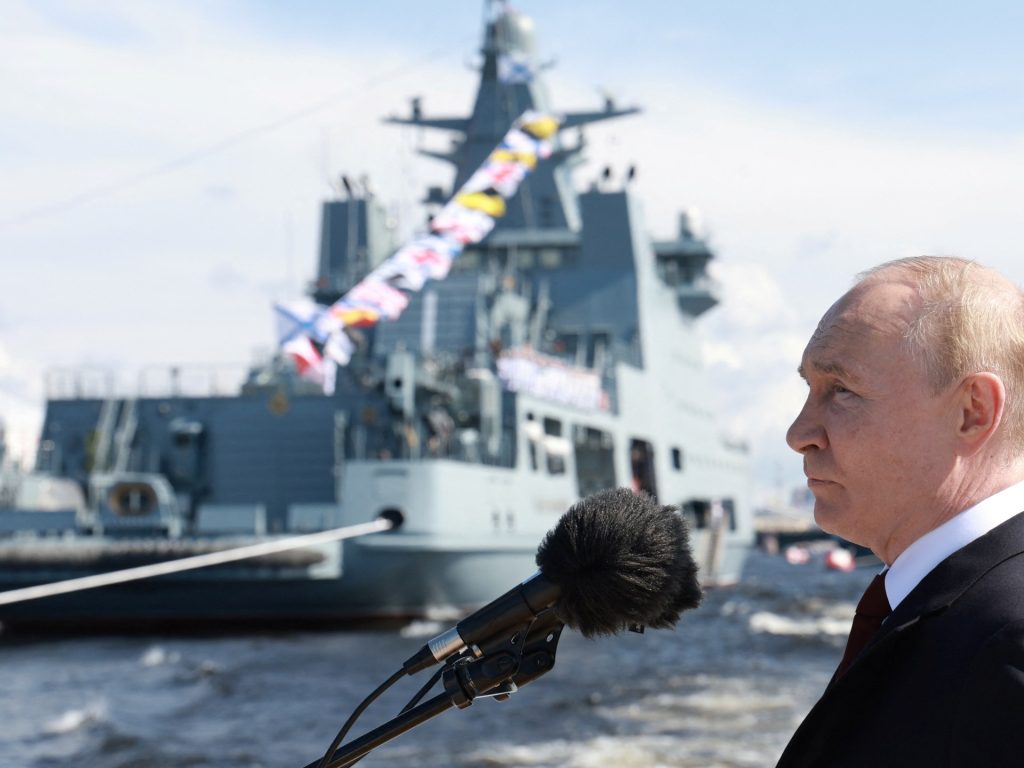The Russian leader threatened to resume production of intermediate-range nuclear weapons if the United States deploys missiles in Germany.
Russian President Vladimir Putin has warned the United States against stationing long-range missiles in Germany, saying that if it did so Russia would resume production of intermediate-range nuclear weapons and place similar missiles within range of Western countries.
The United States on July 10 Long-range missile deployment The weapons are due to be introduced in Germany from 2026 as part of a long-term militarisation programme that also includes SM-6, Tomahawk cruise missiles and hypersonic weapons under development.
Speaking to sailors from Russia, China, Algeria and India in the former imperial capital of St. Petersburg on Sunday to mark Russian Navy Day, Putin said the U.S. move risked triggering a Cold War-style missile crisis.
“The flight time of a missile, which in future may be equipped with a nuclear warhead, to a target on our territory will be about 10 minutes,” Putin said.
“We will take similar steps and deploy them in light of the actions of the United States, its European satellites and other parts of the world.”
Such missiles, with ranges of 500 to 5,500 km (310 to 3,420 miles), were covered by the Intermediate-Range Nuclear Forces (INF) Treaty, signed by the United States and the Soviet Union in 1987. But both Washington and Moscow were Withdrew from arms control treaties In 2019, each side accused the other of misconduct.
Putin, who sent troops into Ukraine in 2022, has framed the war as part of a historic struggle with the West, which he says humiliated Russia by encroaching on what he sees as its sphere of influence after the Soviet Union collapsed in 1991.
Ukraine and the West say Putin is engaged in an imperialist territorial grab and have vowed to topple Russia, which currently controls about 18 percent of Ukraine. Including Crimeaand parts of four regions in eastern Ukraine.
Russia claims that these lands, once part of the Russian Empire, are now part of Russia again and will never be returned.
“Direct Confrontation”
Russian and US diplomats say relations between the two countries are worse than they were during the Cuban Missile Crisis in 1962. Both countries have called for de-escalation but have been accused of taking steps that increase tensions.
Putin said the United States had transferred the Typhon missile system to Denmark and the Philippines, and compared the U.S. plan to NATO’s decision to deploy Pershing II launchers in Western Europe in 1979.
The Soviet leadership, including General Secretary Yuri Andropov, feared that the deployment of Pershing IIs was part of an elaborate U.S.-led plan to eliminate the Soviet political and military leadership and cut off the Soviet leadership.
“The situation is reminiscent of the Cold War events related to the deployment of American medium-range Pershing missiles in Europe,” Putin said.
The United States deployed Pershing ballistic missiles in West Germany in the 1980s at the height of the Cold War, and U.S. missiles remained in place in Germany after reunification into the 1990s.
But after the end of the Cold War, as the threat from Moscow receded, the United States drastically reduced the number of missiles stationed in Europe.
The Kremlin had already warned in mid-July that the proposed US deployment would mean European capitals would become targets for Russian missiles.
“We are moving steadily towards the Cold War. All the features of the Cold War with direct confrontation are returning,” Kremlin spokesman Dmitry Peskov told reporters on state television.


